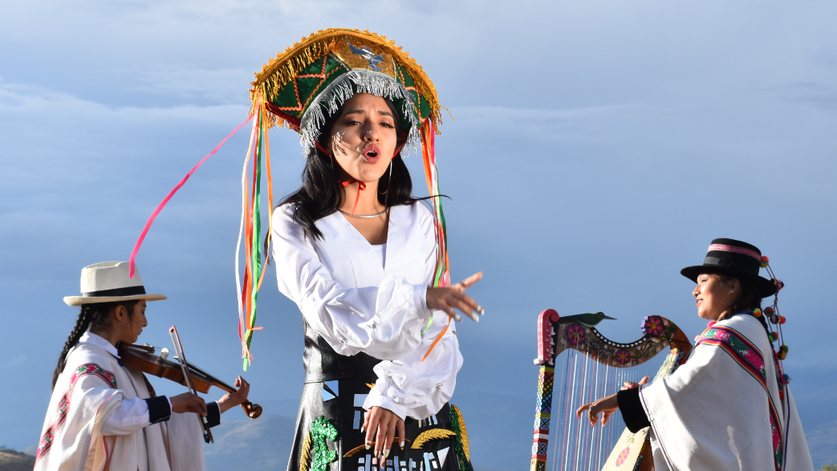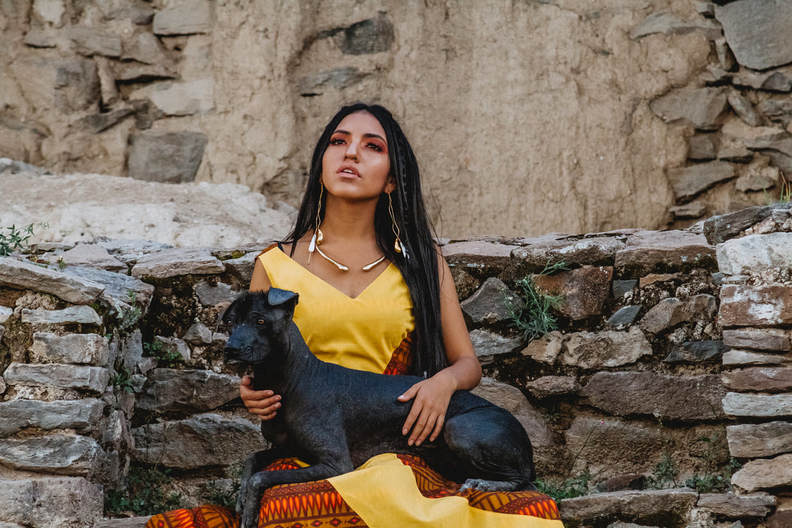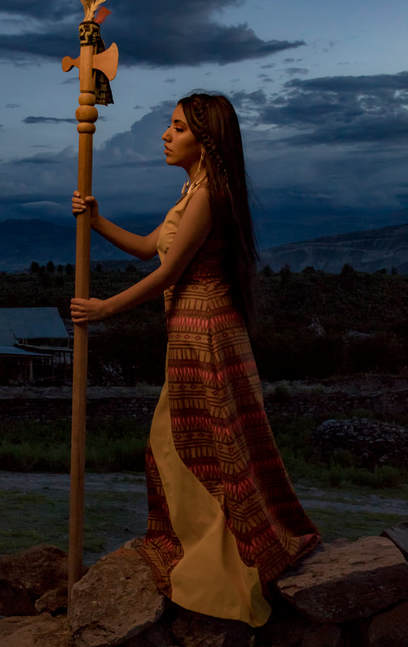Interview with Quechua Pop Singer Renata Flores Rivera
Renata Flores Rivera is a Peruvian singer whose cover of the song The Way You Make Me Feel by Michael Jackson, in Quechua, became viral through social media. Quechua is the native language of the Incas in South America and, like most of our indigenous languages, finds itself in danger due to sociopolitical and economic factors. Renata Flores has decided to confront this issue and revitalize her roots through her songs in Quechua. After several years, Renata has released her own songs in the genres of Pop and Trap, such as Qawachkanchik chay Killallata (Looking at the Same Moon), Tijeras (Scissors) and Miradas (Glances), to shed light on several social issues.
GERALD PADILLA: Renata, thank you for being with us on Latino Book Review.
RENATA FLORES RIVERA: Thank you for the interview. Sunqullay (Thank you wholeheartedly).
RENATA FLORES RIVERA: Thank you for the interview. Sunqullay (Thank you wholeheartedly).
PADILLA: Tell us a bit about your Quechua roots. Where did the passion, pride and sense of social responsibility to preserve the language of your ancestors come from?
FLORES RIVERA: It came from home. My grandmothers speak Quechua—my family passed their roots onto me. When I was 8 years old I would ask myself why people rejected my grandmother, and when I grew up I understood it was because of her mother tongue which is Quechua. This is where my social responsibility to protect, value, respect, and love Quechua as well as our ancestors was born.
PADILLA: How did you begin your musical journey? And what prompted you to sing popular Michael Jackson and Alicia Keys songs in Quechua?
FLORES RIVERA: It came from home. My grandmothers speak Quechua—my family passed their roots onto me. When I was 8 years old I would ask myself why people rejected my grandmother, and when I grew up I understood it was because of her mother tongue which is Quechua. This is where my social responsibility to protect, value, respect, and love Quechua as well as our ancestors was born.
PADILLA: How did you begin your musical journey? And what prompted you to sing popular Michael Jackson and Alicia Keys songs in Quechua?
FLORES RIVERA: It started when I was 13 years old, when I participated in The Voice Kids (Peru). I passed on to the battle phase, and was later eliminated. But I wanted to continue singing. especially a cover of The House of the Rising Sun by The Animals—I loved this song. Until one day, my mom had me listen to a Quechua version. I was really impressed because the Quechua sounded very well with the song. We recorded that cover and it became viral on Facebook. I didn't know that a lot of people were going to like it. From there, I started recording other covers in Quechua such as: Alicia Keys and Michael Jackson. They have always been my favorite singers so I started doing their covers.
PADILLA: In the intro of your song Qawachkanchik chay Killallata (Looking at the Same Moon) you say, "Do you know who you are? / There were good women / There were good men / There were great cities / Perhaps by remembering / you will love yourself the way you are." What inspired you to write the lyrics for this song?
FLORES RIVERA: I was inspired by our ancestors (The Inkas)—remembering great people such as Mama Ocllo, Pachacutec, etc., as well as remembering great civilizations such as Machu Pichu, Wari (The place where I recorded the song Qawachkanchik chay Killallata). With this song I wanted to portray our identity—love ourselves just the way we are.
PADILLA: In the intro of your song Qawachkanchik chay Killallata (Looking at the Same Moon) you say, "Do you know who you are? / There were good women / There were good men / There were great cities / Perhaps by remembering / you will love yourself the way you are." What inspired you to write the lyrics for this song?
FLORES RIVERA: I was inspired by our ancestors (The Inkas)—remembering great people such as Mama Ocllo, Pachacutec, etc., as well as remembering great civilizations such as Machu Pichu, Wari (The place where I recorded the song Qawachkanchik chay Killallata). With this song I wanted to portray our identity—love ourselves just the way we are.
|
PADILLA: In your song Tijeras you capture the pain caused by femicide. You also speak strongly about the lack of justice and the corruption by politicians. In this song you say, "Nobody sees anything / I can't do anything / I want to speak / With a lot of commotion / nobody listens / to what I say / therefore I say / I'll yell." How did the need to write such a painful yet necessary song arise?
FLORES RIVERA: With this song, I want all women to not be silent! And for them to have the courage to say ENOUGH with the violence, corruption, femicides, etc. I also try to portray the cry of women and their needs in the face of justice and the world. PADILLA: How has your family and community responded to the birth and growth of your artistic career? FLORES RIVERA: My family is very happy with what I do because, thanks to them, I am bringing forth our language and our identity. People in my country become surprised when they hear Quechua in urban and popular music. Thanks to them and their support I will continue with this project. PADILLA: As a young Peruvian, female, singing in Quechua, you have broken a lot of barriers. Do you have a goal or dream in the musical field? |
FLORES RIVERA: I have a lot of dreams. One of them is for my music to be heard worldwide. For Quechua to be valued and not discriminated by the youth. Another dream is for them to sing my songs at the top of their voice in Quechua.
PADILLA: Are you working in any musical projects at the moment? And where can we find more of your music?
PADILLA: Are you working in any musical projects at the moment? And where can we find more of your music?
FLORES RIVERA: Yes, I'm currently working on new singles so I can have an album. You can follow me on Youtube, Instagram, Facebook, Spotify, Amazon and all of the digital platforms.
PADILLA: What message would you like to give our youth who still speak their native languages and those who perhaps, because of centuries of colonization and Eurocentric school systems, don't know their roots?
PADILLA: What message would you like to give our youth who still speak their native languages and those who perhaps, because of centuries of colonization and Eurocentric school systems, don't know their roots?
FLORES RIVERA: Don't be ashamed of your identity and ability to speak your native mother tongue. You need to treasure it, love it and respect it. Also, being respectful with people who speak their native languages will help prevent their disappearance in South America and the rest of the world.
PADILLA: Renata, thank you very much for sharing your art, vision and ideals with us. We wish you great success and a long musical career.
FLORES RIVERA: Thank you for the interview and for helping share this message.
PADILLA: Renata, thank you very much for sharing your art, vision and ideals with us. We wish you great success and a long musical career.
FLORES RIVERA: Thank you for the interview and for helping share this message.
|
|
|
Comment Box is loading comments...
|
|










